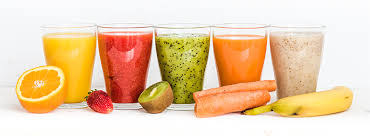When you feel bloated, tired, and filled to the brim with delicious holiday food and drink you pretty much want to un-feel that way.
Especially because it's kind of impossible to ignore all the messages that are around us in the new year that it's time to lose weight and start your diet. So, when you see the way juice cleanses are marketed — that they can rid you of those "toxins" you ingested and maybe help you drop some weight — they can seem like a great idea.
To learn more about the physical and emotional effects of cleanses, we talked to Dr. Holly Lofton, director of the Medical Weight Management Program at NYU Langone Medical Center; registered dietitian Brian St. Pierre, director of performance nutrition at Precision Nutrition; and Christy Harrison, a registered dietitian and certified intuitive eating counselor. Keep in mind that there's no real universal definition of a cleanse — some are a couple days of fruit or vegetable juice, others are longer and include hot water with lemon and cayenne pepper, and still others are soups only. In this post we're talking about fruit and/or vegetable juice cleanses, generally.
1. Fun fact: Your body has built-in mechanisms that keep everything clean 'n' tidy and moving nicely.
2. In fact, you can think of your digestive system, liver, and kidneys as a waste treatment plant. Their job is literally to do the thing a cleanse or detox claims to do: treat and dispose of garbage.
3. Also: Nope, your system doesn't need a "break," even after a holiday season of more and richer foods than usual.

4. And you can get back to your baseline of feeling better simply by returning to your everyday, nonholiday way of eating.

5. Cleanses are not amazing for your mental health or your relationship with food.
At the very least, Harrison says, the hunger and deprivation cleanses can set you up to eat to the point of discomfort once the cleanse is over. Worse still, "they can trigger disordered eating and full-blown eating disorders in people who are at risk," which, she points out is potentially two-thirds of women in the US, according to a 2009 study of more than 4,000 women.
"Like other forms of restrictive eating, cleanses make you ignore your hunger cues, which causes them to get out of whack, and ultimately creates more angst with food," she says. So, if you struggle in general with your relationship with food, cleanses are likely to just make that worse, rather than provide some kind of "reset."
6. Unlike a lot of stuff we do to/with our bodies in the name of health, juice cleanses have never really been studied.
As a 2015 review in the Journal of Human Nutrition and Dietetics points out, "no randomised controlled trials have been conducted to assess the effectiveness of commercial detox diets in humans." Without rigorous research, we don't really know for sure what the benefits and risks of cleanses really are.
7. If you drink only fruit juice, you're taking in a lot of sugar.


